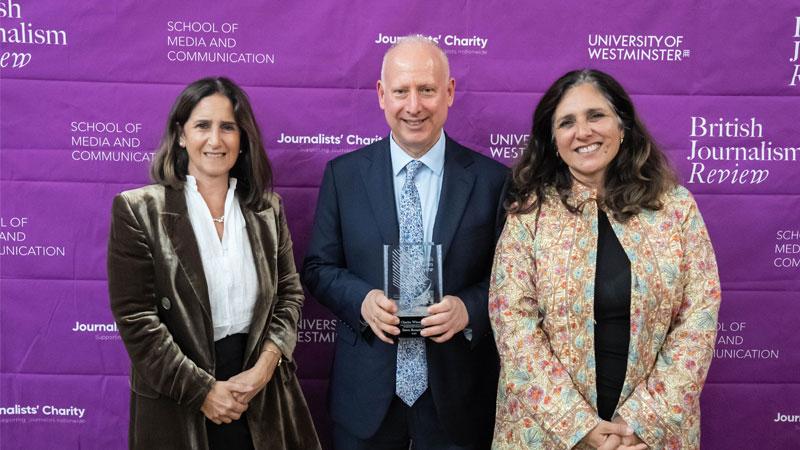Organised by the British Journalism Review (BJR) and the University of Westminster, with support from the Journalists’ Charity, the annual Charles Wheeler Award was presented this year to BBC News Russia editor Steve Rosenberg at the University’s historic Regent Street Cinema.

Now in its 17th year, the Charles Wheeler Award is recognised as one of the most prestigious awards in the journalism calendar. Starting in 2009, with Jeremy Paxman as its inaugural winner, the award is presented each year by Charles Wheeler’s daughters Marina and Shirin.
This year’s winner, Steve Rosenberg, has been reporting from Russia since 2000. Apart from a short stint as Berlin correspondent, Rosenberg has been BBC’s Moscow correspondent since 2003 and was named as its Russia Editor in 2022.
He has covered a range of stories from Russia including the Kursk submarine disaster, the Nord Ost theatre siege and the Beslan school attack. He has challenged Russian President Vladimir Putin on numerous occasions, including on the attempted assassination of Sergei and Yulia Skripal and Russia’s war on Ukraine.
In 2023, Rosenberg’s interview with long-time leader of Belarus Alexander Lukashenko was named Network Interview of the Year by the Royal Television Society Television Journalism Awards. He was also awarded Broadcaster of the Year at the London Press Club Awards.

Guest speaker Susie Dent
Last night’s event began with a short address from lexicographer and etymologist Susie Dent, who delivered an uplifting message about the importance of using positive language, celebrating those around you and keeping hope in today’s political climate.
This was followed by the presentation of the award and a Q&A with Rosenberg chaired by Steven Barnett, Professor of Communications at the University of Westminster and BJR Editorial Board member, who founded the Wheeler Award in 2009. The questions and conversation ranged across a number of topics including Rosenberg’s appreciation of Russian culture and its people, the difficult balancing act of truth-telling in a country that does not welcome a free press, and his new-found fame within Russia as someone who has challenged Putin on Russian TV.

Professor Steven Barnett hosting a Q&A with Steve Rosenberg
In his acceptance speech, Rosenberg said: “To be mentioned in the same sentence as Charles Wheeler is amazing, but to receive an award in his name is such an honour. Charles Wheeler nailed the golden rule for any foreign correspondent in a single sentence: say what you think, as well as what you know, as a result of being where you are. Recording from Moscow, I try to do that.
“Russia’s full-scale invasion of Ukraine cast a huge shadow over everything, but I believe that it is important for me to be there, to try to report on what is happening, to try to document these dramatic and dangerous times. I could not do that without the small but amazing team that works with me in Russia and the support of my family.”
Professor Barnett said: “Last night was another celebration of fantastic journalism, which rightly recognised one of today’s most accomplished broadcast journalists. Steve Rosenberg’s insights into Russian life and politics, conveyed with knowledge, clarity, impartiality and humour, are in the best tradition of broadcast reporting which Charles Wheeler represented.”
Westminster’s collaboration with the BJR and the Charles Wheeler Award showcases the University’s strategic commitment to the UN Sustainable Development Goals (SDGs). By spotlighting the importance of journalism in amplifying voices, informing the public and holding power to account, the University is helping drive forward SDG 10: Reduced Inequalities, 16: Peace, Justice and Strong Institutions and 17: Partnerships for the Goals.
Find out more about Media and Communication courses at the University of Westminster.









